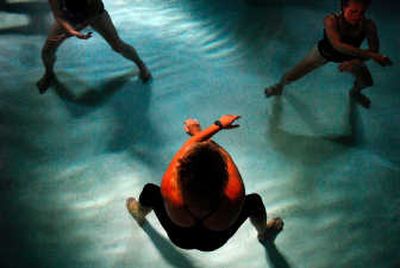Ai chi offers exercise in water

Waning autumn sunlight filtered through a high window, making dazzling patterns in the water. The reflected sun glinted off palm trees and white sandy beaches, while an azure ocean sprawled in the distance.
No, this soothing scene isn’t from a travel brochure. The Mediterranean beach is actually a mural elegantly arched on the walls of the water therapy room at North Spokane Sports and Physical Therapy Clinic.
But for the group that gathered recently for their weekly ai chi class, this oasis is just as relaxing as an island getaway. Patty Murphy, assistant aquatic director/adjunct faculty member at Whitworth University, teaches the practice of ai chi. This combination of deep diaphragmatic breathing and motion has been likened to tai chi in water.
“A lot of people quit tai chi because of balance issues and fear of falling,” Murphy said. “With ai chi you have the supportive cushion of the water.”
Barb Moe, a physical therapist at the clinic, stopped by during the class. “This inviting atmosphere is great for people with arthritis and back injuries. It’s a fantastic way to increase range of motion,” she said.
According to Murphy, ai chi has been in the United States about 15 years. For the veteran aquatics instructor, the discovery of this practice came at a great time. “I’m an aging athlete,” she said with a grin. For her, the exercise added a flexibility and relaxation component to her regular water workouts.
Participants in her Monday class ranged in age from 49 to 82. As they entered the warm pool, audible sighs filled the room.
“We keep the pool at 92 degrees. Just standing in water actually increases your heart rate,” Murphy said, and added, “These exercises are great for core strength, balance and flexibility.”
Alfred Anderson and his wife, Cathy, have been attending the class for a little over a year.
“I have an assortment of little injuries that have to be worked regularly to maintain range of motion,” he said.
“Our doctors recommended it highly. It’s gentle on your joints.”
Helen Allen agreed as she stood in the softly undulating pool. “It’s the only thing I can do because of my back. I feel great in the water,” she said.
All of the exercises flow in continual circular patterns. Murphy said the slow, broad movements and deep breathing create a feeling of harmony that, “with repetition becomes internal and fosters relaxation.”
Participant Peggy Johnsen said, “This is a wonderful companion to my meditation practice.” Johnsen, who has arthritis in her spine, added, “I can do things in the water that I can’t do on land. It’s a wonderful feeling of reconnecting to muscles you haven’t been using.”
Murphy said ai chi is beneficial for aggressive athletes as well. “They have to let go of the competitiveness. It’s great for practicing visualization.”
She said the Whitworth volleyball team begs for ai chi classes.
She slid into the water and began the class. Soothing music added to the serene atmosphere. “Diaphragmatic breathing gives your internal organs a massage and allows oxygenated blood to flow to problem areas much quicker,” Murphy said.
As the class progressed, the gentle, fluid movements resembled a languid water ballet.
The group gracefully stretched and arched, many with eyes closed as they concentrated on their breathing.
A Japanese proverb says, “Willow does not break under weight of snow.” Murphy said this is the underlying tenet of ai chi. As she guided the class through the exercises, sunlight shimmered and skipped across the pool.
Murphy said, “This sort of becomes a symphony for your body.”